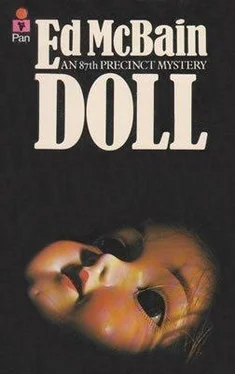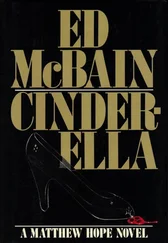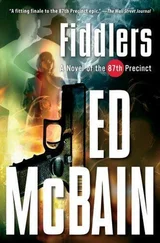Ed McBain - Doll
Здесь есть возможность читать онлайн «Ed McBain - Doll» весь текст электронной книги совершенно бесплатно (целиком полную версию без сокращений). В некоторых случаях можно слушать аудио, скачать через торрент в формате fb2 и присутствует краткое содержание. Город: London, Год выпуска: 1976, ISBN: 1976, Издательство: Pan, Жанр: Полицейский детектив, на английском языке. Описание произведения, (предисловие) а так же отзывы посетителей доступны на портале библиотеки ЛибКат.
- Название:Doll
- Автор:
- Издательство:Pan
- Жанр:
- Год:1976
- Город:London
- ISBN:978-0330248235
- Рейтинг книги:3 / 5. Голосов: 1
-
Избранное:Добавить в избранное
- Отзывы:
-
Ваша оценка:
- 60
- 1
- 2
- 3
- 4
- 5
Doll: краткое содержание, описание и аннотация
Предлагаем к чтению аннотацию, описание, краткое содержание или предисловие (зависит от того, что написал сам автор книги «Doll»). Если вы не нашли необходимую информацию о книге — напишите в комментариях, мы постараемся отыскать её.
Doll — читать онлайн бесплатно полную книгу (весь текст) целиком
Ниже представлен текст книги, разбитый по страницам. Система сохранения места последней прочитанной страницы, позволяет с удобством читать онлайн бесплатно книгу «Doll», без необходимости каждый раз заново искать на чём Вы остановились. Поставьте закладку, и сможете в любой момент перейти на страницу, на которой закончили чтение.
Интервал:
Закладка:
She took Parker to a rented room on Culver. Parker was very drunk — he had begun drinking at twelve noon when word of Carella’s death reached the squadroom — but he was not drunk enough to forget that he could not arrest this girl until she exposed her ‘privates.’ He waited until she took off her clothes, and then he showed her his shield and said she could take her choice, a possible three years in the jug, or a pleasant hour or two with a very nice fellow. The girl, who had met very nice fellows like Parker before, all of whom had been Vice Squad cops looking for fleshy handouts, figured this was only a part of her normal overhead, nodded briefly, and spread out on the bed for him.
Parker was very very drunk.
To the girl’s great surprise, he seemed more interested in talking than in making love, as the euphemism goes.
‘What’s the sense of it all, would you tell me?’ he said, but he did not wait for an answer. ‘Son of a bitch like Carella gets cooked in a car by some son of a bitch, what’s the sense of it? You know what I see every day of the week, you know what we all of us see every day of the week, how do you expect us to stay human, would you tell me? Son of a bitch gets cooked like that, doing his job is all, how do you expect us to stay human? What am I doing here with you, a two-bit whore, is that something for me to be doing? I’m a nice fellow. Don’t you know I’m a nice fellow?’
‘Sure, you’re a nice fellow,’ the girl said, bored.
‘Garbage every day,’ Parker said. ‘Filth and garbage I have the stink in my nose when I go home at night You know where I live? I live in a garden apartment in Majesta. I’ve got three and a half rooms, a nice little kitchen, you know, a nice apartment. I’ve got a hi-fi set and also I belong to the Classics Club. I’ve got all those books by the big writers, the important writers. I haven’t got much time to read them, but I got them all there on a shelf, you should see the books I’ve got. There are nice people living in that apartment building, not like here, not like what you find in this crumby precinct, how old are you anyway, what are you nineteen, twenty?’
‘I’m twenty-one,’ the girl said.
‘Sure, look at you, the shit of the city.’
‘Listen, mister—’
‘Shut up, shut up, who the hell’s asking you? I’m paid to deal with it, all the shit that gets washed into the sewers, that’s my job. My neighbors in the building know I’m a detective, they respect me, they look up to me. They don’t know that all I do is handle shit all day long until I can’t stand the stink of it any more. The kids riding their bikes in the courtyard, they all say, “Good morning, Detective Parker.” That’s me, a detective. They watch television, you see. I’m one of the good guys. I carry a gun. I’m brave. So look what happens to that son of a bitch Carella. What’s the sense?’
‘I don’t know what you’re talking about,’ the girl said.
‘What’s the sense, what’s the sense?’ Parker said. ‘People, boy, I could tell you about people. You wouldn’t believe what I could tell you about people.’
‘I’ve been around a little myself,’ the girl said drily.
‘You can’t blame me,’ he said suddenly.
‘What?’
‘You can’t blame me. It’s not my fault.’
‘Sure. Look, mister, I’m a working girl. You want some of this, or not? Because if you—’
‘Shut up, you goddamn whore, don’t tell me what to do.’
‘Nobody’s—’
‘I can pull you in and make your life miserable, you little slut. I’ve got the power of life and death over you, don’t forget it.’
‘Not quite,’ the girl said with dignity.
‘Not quite, not quite, don’t give me any of that crap.’
‘You’re drunk,’ the girl said. ‘I don’t even think you can—’
‘Never mind what I am, I’m not drunk.’ He shook his head. ‘All right. I’m drunk, what the hell do you care what I am? You think I care what you are? You’re nothing to me, you’re less than nothing to me.’
‘Then what are you doing here?’
‘Shut up,’ he said. He paused. ‘The kids all yell good morning at me,’ he said.
He was silent for a long time. His eyes were closed. The girl thought he had fallen asleep. She started to get off the bed, and he caught her arm and pulled her down roughly beside him.
‘Stay where you are.’
‘Okay,’ she said. ‘But look, you think we could get this over with? I mean it, mister, I’ve got a long night ahead of me. I got expenses to meet.’
‘Filth,’ Parker said. ‘Filth and garbage.’
‘Okay, already, filth and garbage, do you want it not?’
‘He was a good cop,’ Parker said suddenly.
‘What?’
‘He was a good cop,’ he said again, and rolled over quickly and put his head into the pillow.
Chapter 6
At seven-thirty Wednesday morning, the day after the burned wreckage was found in the adjoining state, Bert Kling went back to the apartment building on Stafford Place, hoping to talk again to Ernest Cyclops Messner. The lobby was deserted when he entered the building.
If he had felt alone the day that Claire Townsend was murdered, if he had felt alone the day he held her in his arms in a bookshop demolished by gunfire, suddenly bereft in a world gone cold and senselessly cruel, he now felt something curiously similar and yet enormously different.
Steve Carella was dead.
The last words he had said to the man who had been his friend were angry words. He could not take them back now, he could not call upon a dead man, he could not offer apologies to a corpse. On Monday, he had left the squadroom earlier than he should have, in anger, and sometime that night Carella had met his death. And now there was a new grief within him, a new feeling of helplessness, but it was coupled with an overriding desire to set things right again — for Carella, for Claire, he did not really know. He knew he could not reasonably blame himself for what had happened, but neither could he stop blaming himself. He had to talk to Cyclops again. Perhaps there was something further the man could tell him. Perhaps Carella had contacted him again that Monday night, and uncovered new information that had sent him rushing out to investigate alone.
The elevator doors opened. The operator was not Cyclops.
‘I’m looking for Mr Messner,’ Kling told the man. ‘I’m from the police.’
‘He’s not here,’ the man said.
‘He told us he has the graveyard shift.’
‘Yeah, well, he’s not here.’
‘It’s only seven-thirty,’ Kling said.
‘I know what time it is.’
‘Well, where is he, can you tell me that?’
‘He lives someplace here in the city,’ the man said, ‘but I don’t know where.’
‘Thank you,’ Kling said, and left the building.
It was still too early in the morning for the rush of white-collar workers to subways and buses. The only people in the streets were factory workers hurrying to punch an eight-a.m. timeclock; the only vehicles were delivery trucks and an occasional passenger car. Kling walked swiftly, looking for a telephone booth. It was going to be another beautiful day; the city had been blessed with lovely weather for the past week now. He saw an open drugstore on the next comer, a telephone plaque fastened to the brick wall outside. He went into the store and headed for the directories at the rear Ernest Cyclops Messner lived at 1117 Gainesborough Avenue in Riverhead, not far from the County Court Building. The shadow of the elevated-train structure fell over the building, and the frequent rumble of trains pulling in and out of the station shattered the silence of the street. But it was a good low-to-middle-income residential area, and Messner’s building was the newest on the block. Kling climbed the low flat entrance steps, went into the lobby, and found a listing for E. Messner. He rang the bell under the mailbox, but there was no answering buzz. He tried another bell. A buzz sounded, releasing the lock mechanism on the inner lobby door. He pushed open the door, and began climbing to the seventh floor. It was a little after eight a.m., and the building still seemed asleep.
Читать дальшеИнтервал:
Закладка:
Похожие книги на «Doll»
Представляем Вашему вниманию похожие книги на «Doll» списком для выбора. Мы отобрали схожую по названию и смыслу литературу в надежде предоставить читателям больше вариантов отыскать новые, интересные, ещё непрочитанные произведения.
Обсуждение, отзывы о книге «Doll» и просто собственные мнения читателей. Оставьте ваши комментарии, напишите, что Вы думаете о произведении, его смысле или главных героях. Укажите что конкретно понравилось, а что нет, и почему Вы так считаете.












